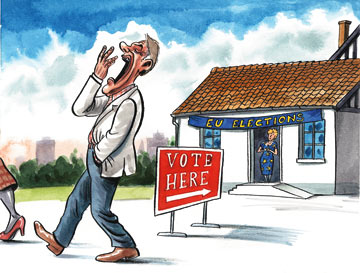Disappointing registration for St. Maarten voting in EU elections
Of the more than 19,000 Dutch nationals living in St. Maarten only 178 have the opportunity to play their part in guiding the future of the European Union (EU) by voting in the 2014 European Parliamentary elections. Dutch nationals, living in St. Maarten, had to register before April 10, 2014, to be able to cast a vote.
Policy Advisor attached to the Office of the Dutch Representation in St. Maarten, Bianca van der Lee, said although disappointed by the level of interest in this elections, the process is running smoothly for the persons who are registered. She said there is a constant flow of people dropping in to cast their votes. Registered persons have until May 22, 3:00pm to vote at the office of the Dutch Representation on Front Street # 26.
St. Maarten’s President of Parliament Gracita Arrindell was among the first to cast her vote on Tuesday, “I call on all citizens, who registered up until April 10, to exercise their democratic right to vote between now and May 22. I made use of this right this afternoon and voted for the candidate of my choice. Not too long ago, not everyone could vote, including women. To date there are millions of people around the world who still cannot or are not allowed to freely vote for the party or candidate of their choice.”
Initiatives such as an information session at the University of St. Martin and an appeal by several political leaders were carried out in St. Maarten to improve the level of interest in the 2014 EU elections. But efforts proved futile. There was a very poor turnout at the information session and ultimately only 178 persons registered to vote.
Van der Lee said it is not the responsibility of her office to drum up support for the elections, however because there is an agreement to use their office facilities, there was an extra effort to get a strong support from Dutch nationals living in St. Maarten.
Brussels and the candidates are responsible for motivating voters, however EU candidates provided no broad-base public information about their platform to the St. Maarten public. The Netherlands has 26 seats in the EU parliament. As of 2009, Dutch nationals living in the former Netherlands Antilles and Aruba are able to vote in these elections. The fact that St. Maarten seems so far from the EU, has influenced a negative turn-out in this elections as some potential voters feel there is not much influence for policy that affect the daily lives of the people of St. Maarten.
The European elections give voters the chance to influence the future political course of the EU when they elect the 751 Members of the European Parliament (MEPs) to represent their interests for the next five years.
There have been 766 Members of the European Parliament since Croatia joined the EU in July 2013 but this number is being scaled down at the 2014 elections to 751 and will stay at that level in future. These MEPs will represent over 500 million citizens in 28 member states. The seats are allocated among the various states, by the EU treaties, on the basis of ‘digressive proportionality’, meaning countries with larger populations have more seats than smaller ones but the latter have more seats than strict proportionality would imply.
The new political majority that emerges from this elections will shape European legislation over the next five years especially in areas from the single market to civil liberties. The Parliament – the only directly elected EU institution – is now a linchpin of the European decision-making system and has an equal say with national governments on nearly all EU laws.
Of interest to St. Maarten is the European Union’s long-term spending budget which has to be approved by national governments and MEPs, then each year the two sides decide together how the annual budget will be spent. Policies such as agriculture, regional development, energy, transport, the environment, development aid and scientific research all receive EU funding. Parliament is also responsible for checking later if the taxpayer’s money has been used as intended and for signing off on the accounts if it is satisfied.




